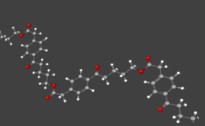|
CURRENT RESEARCH:
My research is dedicated to understanding composite and biological tissue ageing phenomena through experimental and computational multiscale chemomechanical modeling. Experimental part is focused on the ageing effects (from mechanical and chemical point of view). Modeling of the material ageing (and general material properties changes) is done by means of chemomechanical methods. Chemomechanics as a new interdisciplinary direction in science, deals with the relationship between chemical reactions and mechanical loads by means of multiscale multiparadigm modeling. It can be used in modeling of the influence of chemical reactions on material properties and with the impact of loads (temperature, stresses etc.) into chemical reactivity e.g. hydrolysis.
|
|
 |
|
|
PAST RESEARCH:
"The analysis of properties of composite plastics in durability aspect"
The research was founded by the Polish Ministry of Science and Higher Education under a grant: „ The analysis of the effects of production technology and operation conditions into composite plastics durability " and by the Foundation for Polish Science in MASTER program.
Abstract:
Fibre Reinforced Composite Plastics are non-linear viscoelastic materials. Their properties depend on the arrangement of fibres, strain rate, temperature, strain amplitude and other factors. In addition, because of their molecular structure, are very sensitive to environmental conditions in which they are used. Particularly harmful environment, degrading the material properties, is high humidity and high temperature exceeding the glass transition temperature of the material, above which part of matrices is readily hydrolyzed. Due to the need ensure the sustainability of the product throughout the whole product life, is necessary to create tools for the simulation of strength, including the ageing of the material. In this project, a method of testing and modelling of the mechanical properties of composite plastic with short fibres, including the aging of the material was proposed. Experimental studies of composite plastics, based on polybutylene terephthalate (PBT) reinforced with 20% short glass fibres, have shown that material properties depend mainly on the arrangement of fibres, strain rate and ageing time. On the basis of experimental studies, created non-linear material models for finite element analysis, based on transversely isotropic material model, enhanced by the effect of strain rate and ageing time. Created models, take into account the scattering of material properties after ageing, observed in the experimental studies. Scatter of mechanical properties of the composite, are calculated in the analysis in the form of the confidence intervals for the forces and displacements, within statistically should be 95% of the tested samples. Developed models were validated on the real components from the automotive industry. The error of the model, taking into account the degradation of the material, is within the scattering of properties of Short Fibre Reinforced Polymer Composites after ageing. Comparison of the results of experiment with simulation results shows that the proposed method can be successfully used to predict the product durability taking into account material ageing.
|
|
|





